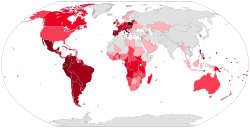
Carlos Filipe Ximenes Belo, SDB, commonly known as Carlos Belo or Ximenes Belo is an East Timorese prelate of the Catholic Church. He became a bishop in 1988 and served as the apostolic administrator of the Diocese of Díli from 1988 to 2002. In 1996, he shared the Nobel Peace Prize with José Ramos-Horta for working "towards a just and peaceful solution to the conflict in East Timor". He is a professed member of the Salesians.
Martinho da Costa Lopes was an East Timorese religious and political leader. He was a priest of the Catholic Church, the highest-ranking official of the Church in East Timor from 1977 to 1983, and a member of the National Assembly in Lisbon.
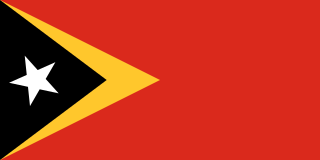
The national flag of East Timor consists of a red field with the black isosceles triangle based on the hoist-side bearing a white five-pointed star in the center superimposed on the larger yellow triangle, also based on the hoist-side, that extends to the center of the flag.

St Joseph's High School is a private Catholic secondary school, located in Dili, Timor Leste. The school was founded by the Catholic Diocese of Díli in 1983–84, when East Timor was still part of Indonesia. In 1993 the school was entrusted to the Society of Jesus, with a ten-year commitment.

The União Nacional dos Escuteiros de Timor-Leste is the national Scouting organization of East Timor. It was founded on December 2, 2005 through the merger of the Corpo de Escuteiros Católicos em Timor-Leste and of Timor-Leste Scouting. The organization is a member of the Comunidade do Escutismo Lusófono. It became a member of the World Organization of the Scout Movement on 22 June 2017.
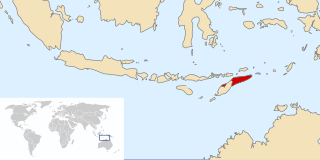
East Timor was a province of Indonesia between 1976 and 1999, during the Indonesian occupation of the country. Its territory corresponded to the previous Portuguese Timor and to the present-day independent country of East Timor.

Baucau is the second-largest city in East Timor, after Dili, the capital, which lies 122 km (76 mi) to its west.
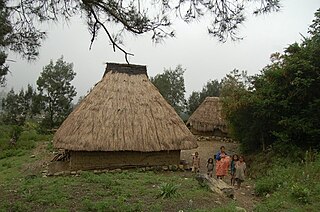
Maliana is a city in East Timor, 149 kilometers southwest of Dili, the national capital. It has a population of 22,000. It is the capital of the district of Bobonaro and Maliana Subdistrict, and is located just a few kilometers from the border with Indonesia. It is also the see city of the Roman Catholic Diocese of Maliana, which was formed by Pope Benedict XVI with territory taken from the Roman Catholic Diocese of Dili.

The majority of the population of East Timor is Christian, and the Catholic Church is the dominant religious institution, although it is not formally the state religion. There are also small Protestant and Sunni Muslim communities.

The Roman Catholic Archdiocese of Díli is an archdiocese located in the city of Díli in Timor-Leste.

The Roman Catholic Diocese of Maliana is a Latin Church diocese of the Catholic Church in East Timor. The newest of the country's three dioceses, it was established in 2010 by Pope Benedict XVI. It serves nearly 300,000 Catholics in the municipalities of Bobonaro, Cova Lima, and Liquiçá, covering a total area of 3,142 km2. The current bishop since the diocese's founding is Norberto do Amaral.

Basílio do Nascimento Martins was the East Timorese Roman Catholic Bishop of Baucau.
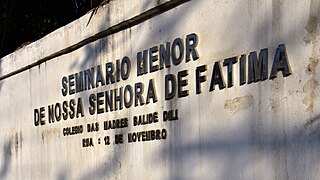
The Minor Seminary of Our Lady of Fatima is a Roman Catholic seminary, located in Dare, Dili, East Timor. Established in 1936, it is the oldest Roman Catholic seminary in East Timor. The seminary was initially established in Manatutu district, south of Dili. In 1951 it was moved to Dare. In 1954 the Vatican canonically registered the seminary. It was taken over by the Jesuits in 1958, and moved to the outskirts of Dili in 1978.

Norberto do Amaral is the Roman Catholic Bishop of Maliana, East Timor. He was appointed on 30 January 2010. Previously, he served as an assistant pastor and as a pastor, as Rector of the Diocesan Minor Seminary in the Diocese of Díli, and in other offices in the Catholic Church in East Timor.
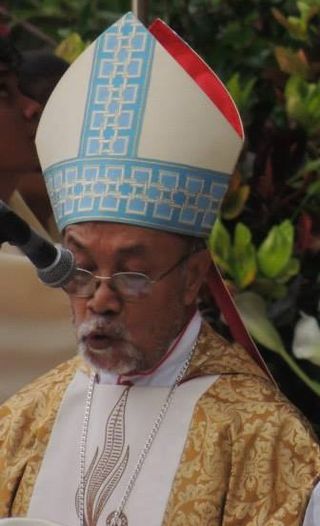
Alberto Ricardo da Silva was the Roman Catholic bishop of Dili, East Timor.
The Seminary of SS Peter and Paul is a Roman Catholic seminary in Dili, East Timor. It is the country’s only major seminary named after the saints Peter and Paul. It is located in Fatumeta.

Virgílio do Carmo da Silva, SDB is an East Timorese Catholic prelate who was appointed Bishop of Dili on 30 January 2016. He became an archbishop when the diocese was elevated in 2019.

Leandro Maria Alves is the Roman Catholic Bishop of Baucau, East Timor. He was appointed on 26 April 2023. Previously, he served as deputy parish priest, parish administrator and parish priest of Dili Cathedral, and in many other offices in the Catholic Church in East Timor.

